DAVID HOLZMAN
The pianist in conversation with Bruce Duffie
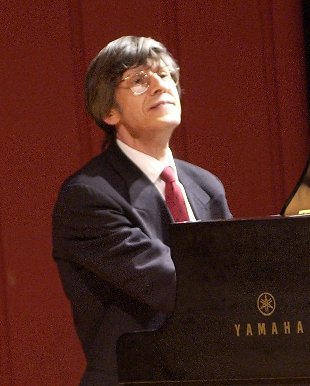
DAVID HOLZMAN
The pianist in conversation with Bruce Duffie

Hailed as a "master pianist" by Andrew Porter in The New Yorker, David Holzman has won acclaim for his recitals and his recordings. Concentrating his virtuosic talents on the 20th Century's keyboard masterworks, Holzman has premiered more than 150 works by various composers and has made first recordings of many of them. He has performed at festivals throughout the world including Darmstadt, Leningrad Spring, the Vienna Schoenberg Festivals and Wolpe Festivals in Toronto, Northwestern University and New York City. His first solo recording, an LP on the CRI label, included Wolpe's Battle Piece and Displaced Spaces, was called "one of the great piano discs of the decade" by Peter G. Davis in New York Magazine. An active writer and lecturer, Holzman's essay On Performing Battle Piece is scheduled for publication in a collection honoring the Wolpe Centennial. He has most recently lectured and performed during the Music in Exile exhibit at the United States Holocaust Memorial Museum and the Stefan Wolpe: Three Lands, One Language festival at C.W. Post Center.
Born in New York in 1949, David Holzman received his BM from Mannes College of Music where he studied with Paul Jacobs, and completed his studies with Nadia Reisenberg at Queens College. Early in his career he was an active chamber musician, performing with New York's major ensembles under conductors including Gerard Schwarz, Arthur Weisberg and Charles Wuorinen. Holzman is Professor of Piano at C.W.Post Center of Long Island University. Recorded on the Albany, Centaur and Bridge labels, his discography ranges across the twentieth century, featuring works from Schoenberg and Bloch, to Sir Peter Maxwell Davies and Donald Martino, to the younger generation of American composers. His recent all-Wolpe CD on Bridge received a Grammy nomination for best solo album and won the Indy Award for best classical album. He is currently at work on a new Bridge album featuring masterpieces of European and American composers from the early 20th Century to the early years of the 21st Century.
During the Wolpe Festival at Northwestern in November of 2001,
I had the chance to chat with David Holzman late one evening after a day of
lectures and performances. We were speaking of recordings, and that’s
where we pick up the conversation . . . . .
Bruce Duffie: You say the recording will be artistically successful. Is that completely your fault, or have you gotten help from producers and engineers?
David Holzman: As a matter of fact, absolutely. The producers were wonderful and the place of the recording was the Masonic Temple in Belgrade, Massachusetts, where the sound was simply fabulous. The actual editing is a more tiring process than the recording, and Matthew Packwood gave me incredible help.
BD: Should the editing be so meticulous and so tiring?
DH: Yes, because I’ve been working on this particular CD a year, and I’ve been working on Wolpe for two decades. At this moment I am at the best I’ve ever been in my career, and after having something in my head for 20 years I can and should do whatever I please with it.
BD: Then why should you rely so much on editing rather than doing three takes and it’s done?
DH: I think what you’re saying is something that I would have thought earlier, particularly dealing with various composers who under the pretense of artistic integrity have said “Oh, spontaneous performance is good, leave in whatever the little slips…” They’re wrong. It didn’t occur to me until working with this wonderful editor that you’re actually going to increase - I wouldn’t say necessarily the spontaneity - but the fluidity of the music and I didn’t realize that. I thought somehow there was something artificial, but it worked in wonderful ways. At this point there are no more than two or three notes that are slightly less than what I want. There is an incredible flow and what really makes me so excited is that for the first time people are going to hear the color of the music. They hopefully will hear in the recording the fact that I’m using my whole body physically.
BD: Did Wolpe ask too much of the keyboard artist?
DH: I used to think that maintaining the struggle is a sufficient victory. After struggling and overcoming the problems, I would realize that struggle is in no way good enough by itself. I think the listeners will struggle when they hear it but they don’t gain anything by hearing a performer struggle.
BD: So your struggle should be in the practice room and not on the concert platform?
DH: That’s a nice ideal situation and it will in no way ever be the truth – except when you’re very lucky. I will call it aerobic exercise, where after fifty minutes you’re suddenly in a wonderful state of mind physically and mentally. I never quite knew it before, but a recording can achieve more spontaneity because of the fact that you have two or three hour stretches. When you get tired it can be a blessing in its own way. Your mind can be entirely devoid of anything, and if your mind is not there, in some way you’re transported to another level and struggle will disappear. That’s a slightly metaphysical point, but self-consciousness of any kind is a sin, and that’s a way of saying if you see a complex score, if you’re going to subdivide a rhythm, if your eyes have to be focused on notes and on the keyboard, that’s self-consciousness, and you will be distorting the music.
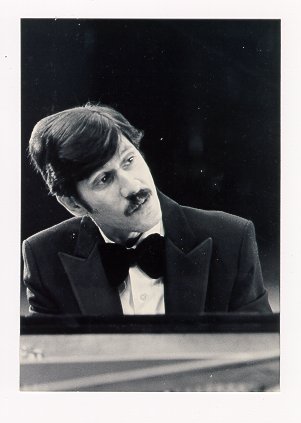 BD: You’re a keyboard artist so you have this wide
range of repertoire to select from. Why did you get into Wolpe and
other modern composers?
BD: You’re a keyboard artist so you have this wide
range of repertoire to select from. Why did you get into Wolpe and
other modern composers?
DH: There are two sides to that. When you say “modern composers” that came very easily and purely out of a certain innate quality which developed at the age of seventeen. I met Wolpe when I was about twelve. I didn’t know anything, but I heard his music and it stayed with me. A few years later I went to the High School of Music and Art, which was a joy. I don’t know if you had a high school experience that was good or bad, but to me, junior high school was my bad experience. High school was good. I went there and started playing student composers, and I remember the great joy I gave them. In my first year of college Messaien was in town and I was a hippie in a sense, so I had a certain religious pretense. I started with Messaien and then everyone would look at me as if I’m something special. I studied with Paul Jacobs at Mannes College and that set me on my journey. I never had any qualms about overcoming the challenges of 20th century music and really showing that in no way is it less expressive, less warm, for the most part, if you’re talking about good music. Now I can go backward to Schumann and Brahms and others.
BD: I was going to ask if you then put romantic composers back into your repertoire?
DH: Oh, absolutely. I went through a certain stage which every performer of modern music goes through, where they think they have to accept every offer that comes to them. I’m no longer doing that now. Occasionally, when somebody offers me a small fee, let's say $250 to play something, I’ll say yes because either the music or the person is special, but that’s a rarity now. I’ve said this before so it’s easy to say again: Music is awfully cruel to anybody, and to a composer maybe most of all because you have two or three levels of greatness. I don’t want to categorize them precisely but you cannot go too far below that without feeling a degree of despair.
BD: Really!?!?
DH: Unfortunately! I think I am exaggerating slightly because I’ve gotten and given pleasure with works which are less than that, but history is not going to be kind to you.
BD: So you ignore these composers?
DH: Me, no! I never have before, but I am starting to shed my sense of unthinking obligation towards even those composers whom I have known and respected for a long time. Because of association, now something has changed and I cannot put on that pretense any more. That’s not only music, that’s a lot of things. The all-Martino program I gave, absolutely, despite the fact that a lot of people for whatever reason don’t like his music, was worth all the effort. I am desperately looking for another major composer that’s going to give me the same inspiration. I haven’t found it but I’m sure it’s there.
BD: Do you look for it in other performances or do you look for it in scores?
DH: More in scores. The etudes of Ligeti look good but I do not think I’m going to have quite the inspiration to spend with them. I don’t quite know why but they seem to me just a little less than spiritual experiences. That’s my impression and I might be wrong, but I’m looking for something.
BD: Do you know what you are looking for?
DH: Oh, I’m still a child, and the pure fact was that I was showing off. I love being able to do things no one else can do, and that will never end. I always want to feel I’m showing off. That’s why when I get critics who say something like, “He’s a fine pianist,” I’m very upset. A word like “fine” bothers me. That’s my own immaturity but I mean it.
BD: You want to be a showoff pianist?
DH: The fact is when I play at my best, which has been often lately, I really overwhelm the listener both with my pianism and my intensity. And that is showing off… except that it’s legitimate. I don’t know that you can separate the two in the sense that I just have seen too many bored listeners. I don’t allow that to happen.
BD: So then you’re communicating directly with each audience member.
DH: For sure.
* * * * * *
BD: From all these scores that are sent to you, how do you decide which to play?
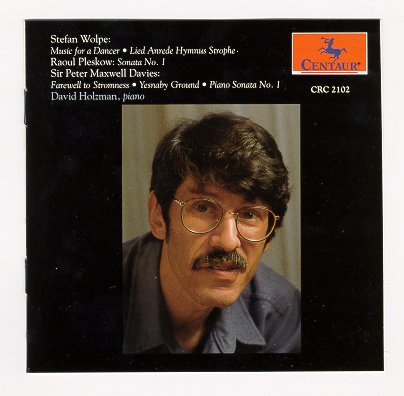 DH: At a certain point you simply have to be
a cold-blooded professional and say “I like it, but now my agent will have
to find a date for me.” People will offer me concerts because they are thinking
of making money from it and I’m beginning to realize you cannot escape that.
I have to simply be slightly nasty and if I do like it, I must find out how
can you help me. There is a strange chemistry between a composer and
a performer. Unless they’re fully mature and experienced, they each
expect the other to do the work
DH: At a certain point you simply have to be
a cold-blooded professional and say “I like it, but now my agent will have
to find a date for me.” People will offer me concerts because they are thinking
of making money from it and I’m beginning to realize you cannot escape that.
I have to simply be slightly nasty and if I do like it, I must find out how
can you help me. There is a strange chemistry between a composer and
a performer. Unless they’re fully mature and experienced, they each
expect the other to do the work
BD: They’re completely reliant on each other?
DH: No, that’s the opposite. The ego of so many of them is that they think that if they went to the trouble to write it, then the performer has to show the gratitude by finding places to play, unaware of the fact that performers are every bit as incapable for the most part as they are. Each thinks the other has more power. They are both wrong, and the degree of honesty is rare. In other words music is like anything else and musicians are in no way morally purer than the average human being.
BD: You seem to make a differentiation between “music” and “musicians,” so let me ask the easy question: What is the purpose of music?
DH: For me, it is, indeed, a spiritual purpose. When you go through all the ups and downs of life, you need something that is not going to resist you. A piano is inert and I can do what I want with the keys. I have to work terribly hard, but it’s all me, whereas human beings are not inert and they are going to react in ways you don’t expect. That’s the comfort of the piano and it is absolutely the deepest comfort I’ll ever find.
BD: Let’s talk about the instrument for a minute. When you sit down at a new piano, how long is it before it is yours?
DH: I’ve never been a fifty-concert-a-year person so it takes me probably a little bit longer to adjust, but by now it’s amazing that it really takes no more than a few minutes. The piano that I just played today had an extraordinarily light touch. My home piano is an old 1905 Steinway and the touch was quite heavy. It’s not quite as heavy now, but it did take me many years to adjust. Now I find it takes no more than a few seconds before I’m familiar with a piano. I know that that my fingers simply have to be more on the surface of the keys to get the same result so the effect is the same. Still, I know that your tonal palette is going to be so different on a light action and I’m much, much happier with a deep action.
BD: Couldn’t you ask the technician to make it a little stiffer?
DH: Not if you go somewhere for a day. They don’t do that.
BD: I see. But if you’re playing a big recital, then I suppose yes.
DH: When you have the luxury to pick and choose, it’s wonderful, but that’s almost never happened in my life. I recently gave a concert on a piano which was exactly like my home piano and maybe that’s why it was so successful. What a joy. But there is also a joy in the mere fact of having to react to a new instrument. I can do that better than reacting to new people. It’s the same idea. You need a certain kind of politeness and delicacy of touch on a piano that is lighter. You can reach a point where it’s impossible. On some pianos in particular, the keys are narrower and the touch is a disaster.
BD: Without being specific have there been times when you’ve just given up on the instrument because it just won’t respond to you?
DH: How do you give up? You can’t refuse to play if that’s what you mean. There’s a degree of fatalism in that.
BD: Have you basically been pleased with the performances you’ve given over the years?
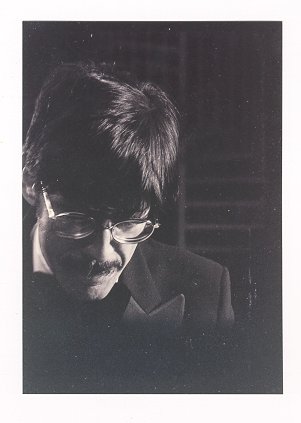 DH: I had gotten into the habit, when learning long and
challenging solo works, of taking my time and letting the music and pianistic
issues slowly be recognized and transformed into a unity of vision.
For several years I found it difficult to learn quickly - a requirement when
performing new music. Thus, I was often upset that first performances
seemed to involve a high degree of mental and physical effort to the detriment
of flow and expression. I finally confronted this problem by realizing
that I could demand more of myself - learning techniques etcetera - and more
of a composer. With middle-age vision, not to mention hearing, I could
no longer accept handwritten manuscripts with small and barely readable notes.
I needed both better eyeglasses and more easily readable scores, and all
parties had to share the responsibilities. While life seldom allows
endless time to achieve one's goals, I now know that the issue will be present
and that solutions are there, given energy and willpower. So the happy
ending is that I am still ready and able to tackle anything offered.
DH: I had gotten into the habit, when learning long and
challenging solo works, of taking my time and letting the music and pianistic
issues slowly be recognized and transformed into a unity of vision.
For several years I found it difficult to learn quickly - a requirement when
performing new music. Thus, I was often upset that first performances
seemed to involve a high degree of mental and physical effort to the detriment
of flow and expression. I finally confronted this problem by realizing
that I could demand more of myself - learning techniques etcetera - and more
of a composer. With middle-age vision, not to mention hearing, I could
no longer accept handwritten manuscripts with small and barely readable notes.
I needed both better eyeglasses and more easily readable scores, and all
parties had to share the responsibilities. While life seldom allows
endless time to achieve one's goals, I now know that the issue will be present
and that solutions are there, given energy and willpower. So the happy
ending is that I am still ready and able to tackle anything offered.
BD: A happy beginning, rather than a happy ending!
DH: It better be, but it only will be with
the help of people like you.
* * * * * *
BD: Tell me a little bit about Wolpe specifically. Did he write well for the piano?
DH: No, but that’s a poor answer in the sense that he wrote in an extraordinarily complex way. Because of the nature of his writing – meaning that the speed, the range of registration and the clumsiness of the chords (they’re clumsy because they’re thick) - you can’t look at the keyboard. You can’t get your hand somewhere and then suddenly change your position. You have to treat 88 keys as if it’s one octave. And it’s crucial. The word for that is “gesture.” I’ve been using it countless times now because when I was young, I studied with Paul Jacobs, and he would talk about gesture. I didn’t know what the heck he was talking about. Maybe it doesn’t mean to me what it meant to him but a gesture is a way of bringing out all the musicality - meaning tone color, rhythm, phrasing - with a physical motion. In no way can your eyes be involved in that. You can hear it in your head, but then your hand has to go there, and you do not have any amount of time to prepare for that because you have to go somewhere else. Wolpe is as good a case as any. Each hand is not only going up and down the keyboard at these rapid paces, each hand is doing it in different places. One accent on one hand will be contradicted by an accent an eighth note later in the other hand, which means one hand is going up and one hand is going down. You can’t look in two directions at once.
BD: But you can hear in two directions at once?
DH: Yes, in your mind, yes. The only way to do that goes back to flamboyant gestures, and for me the eyes have to be closed. If I still have notes in front of me that I have to look at, what I find is that my eyes will glaze over. It’s a way of saying that whatever hazy image I have of the notes has to be sufficient. If I’m staring at notes I lose the ability to make a gesture that’s going to keep the music momentum, the rhythmic momentum, going.
BD: Doesn’t every performer have to do that to a greater or lesser degree?
DH: If they were trained properly when they were young, it became engrained in them and is second nature. But I don’t think that’s the case. I think that too many of them are simply being cautious. They’re going to get somewhere and then play it, or they’re going to look and then play it, and any spontaneity is lost. That’s why audiences can get bored and they can think that music is either abstract or academic when it absolutely isn’t. I mean the flamboyance in Liszt is not that much different than the flamboyance in Wolpe.
BD: Is there a line that connects all good music throughout the ages?
DH: A musical line or a kind of metaphysical line?
BD: Both.
DH: Yes, absolutely, and yet that in no way is saying that form in Mozart is the equivalent of form in Wolpe because Wolpe’s personality would not let him create a satisfying form. Obviously Mozart in his age clearly had a need for some kind of perfect resolution. Wolpe, in the 20th century, being sensitive, being Jewish, being in Berlin and living through what he lived through could not in any honesty create a perfect culmination to whatever he’s doing. I bring up the word “dialectics” because in Wolpe one hand or one voice will be contradicting another and yet it’s not Hegelian. How’s that for a fancy word? Synthesis is not anything that Wolpe would allow himself to achieve.
BD: And it all has to come out as one voice?
DH: No. No. It has to come out as two voices. On piano sometimes it can be three, and it has to come out as two disparate elements. Not just Wolpe, though. In a Schubert Impromptu, you have a line and I spent years hearing and seeing the ends of measures or the ends of four-measure phrases, and I did not have the ability to hear the inner accompaniment. I did not have the ability to separate three parts until working with Martino and Wolpe. Even in the piano sonata of Maxwell Davies, which I’d like to get back to because I could do it full justice now. In Schubert, now, I’ll close my eyes and I’ll absolutely hear that melody from the beginning to the end of the piece. I even recall very distinctly being puzzled by great romantic performers, in Beethoven’s Opus 101 sonata where they’d end a phrase and they’d go right into the next phrase, and I’d say “The phrase is ending, why don’t they take a breath?” But they were right and I was wrong. That’s what I’ve learned.
BD: I assume then you’ll find that perhaps some of the things you’re saying and feeling now will be contradicted by what you learn next year or in the next decade.
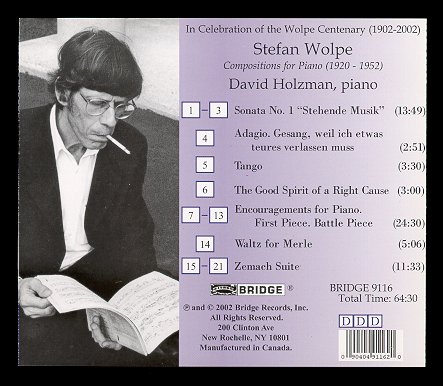 DH: Oh, absolutely, or tomorrow. In other words I
recorded the Wolpe six months ago and two months ago I already knew that
I would do things differently. But different does not necessarily mean
better although I’ll bet the answer is “yes, better.”
DH: Oh, absolutely, or tomorrow. In other words I
recorded the Wolpe six months ago and two months ago I already knew that
I would do things differently. But different does not necessarily mean
better although I’ll bet the answer is “yes, better.”
BD: Which is right?
DH: Right now I have no problem with leaving that up in the air. There’s no doubt about that. One is not right. One is a personal statement where I’m in a slightly more violent mood and where I’m going to allow the chaos of the music to come to the fore to a greater extent. If I’m in a more rational mood, then there’s no doubt that I’ll make the violence and the chaos a little less apparent.
BD: Is there any connection between Martino and Wolpe or just that you happen to play them on the same concerts?
DH: Oh, I don’t think they have that much in common and I don’t think they would really appreciate each other’s music to any great extent. They have been maybe my two greatest loves and concerns for many years. I’ve played all the music that Don wrote and they were massive challenges. I’ve played virtually all the music Wolpe wrote.
BD: OK, how are they different then?
DH: Oh enormously because Martino is more Italian than his parents. His parents were Italian and he’s second generation, which means that it’s almost Verdi. The line and the colors are there to be brought out and a lot of pianists don’t. Wolpe is as German as you’re going to get even when he’s writing in a sort of American jazz mode. Martino uses jazz even more than Wolpe, but they are worlds apart and there’s no way that you can make Wolpe sound lyrical except in a very understated way. That has to come out almost as if by accident - that he is confessing something without really wanting anyone to know it. Martino will be showing his love and sensuality in all the arpeggiated figures and long melodies. But they’re not the only two composers that matter to me.
BD: No, of course not. You play many different creators from varying periods. Is the music that you play for everyone? Or should it be?
DH: Yes. It should be, and it isn’t, and again I don’t think it’s only our culture; it seems to me it’s for the world.
BD: Six billion???
DH: I don’t travel around enough. I do know that when I performed in Russia there was an amazingly receptive audience. People tell me that in China the audience is amazingly receptive. I know also that if I perform in Long Island or various other places where you would not expect them to care, they can care. But it’s not for everyone in the sense that never, never, never will they flock to hear it. If they’re put in a situation where they hear someone performing, they’re going to be surprised at how rewarding it is but I do not think that they go back. There are exceptions, but I don’t think that you convert people. I’m being slightly fatalistic but I really think, like it or not, it’s for a minority and my fear is that the minority is getting even smaller.
BD: Would you want people to flock to concerts of new music like they do to rock legends?
DH: Yes. Now I would. When I was younger, there was something romantic about the idea that I was one of an elite minority. And if I made more money as part of that elite minority I might still want it, but I do feel, now, that I’ve given enough enormous pleasure particularly when I can combine the classics with contemporary. I wish I could do it more, but my reputation is so carved in stone that I don’t have that opportunity. I want to have the opportunity to give people all over the world that pleasure.
BD: Would you rather play an all new-music program or a mixed program?
DH: I’m beginning to take the advice of people I know. There’s no doubt that almost any listener, even the most devout is going to be awfully tired if they hear a program of new music which is quite “serious.” That means it simply should not be done. I know that and I find it hard to change my bearings but it’s a must. And, sad to say, most people I know would agree with that - except composers. That’s their problem.
BD: Do you have any advice for composers?
DH: No. Except that they should remain true to themselves. There’s no doubt whatsoever that if they if they write things which are simpler than they want, or using harmonies which are more acceptable to the public, they’re going to pay a price. I’ve seen it in academia and with colleagues that they lose more than they gain. And because of the fact that I’m still devoted to this, they seem to see me in an almost alien light. They see somebody who’s devoting his life to the best and the challenges of the best and it makes them think. There are many more people than I realized who’re doing what I’m doing – composers and performers and even this sound engineer, Matthew Packwood. It only takes one or two experiences per month for me to have all the heart I need to keep going.
BD: What advice do you have for other performers?
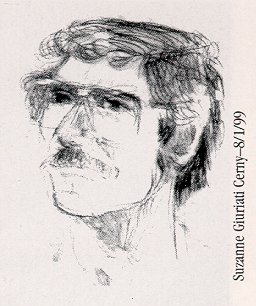 DH: That’s a little more difficult. I get
the feeling that there’s an element of unstated competitiveness which means
that there’s even a greater screen between performers than there is between
a performer and a composer. That’s my own experience and I don’t
think it should be taken as a generality because I really do not have a great
social web. I did at one point by playing in chamber groups, and they
were wonderful people. But at the moment I see a dearth of generosity
I do not quite understand. It’s hard to believe that it’s purely jealousy
because how can you not get over that. You have the few people who
succeed - and they’re remarkably few - and they’re either lucky or their
talents have been recognized. Most people have a little hole in their
soul. It's more than just musicians, but there’s something about
music which gives you a slightly bigger ego or the need to present.
I don’t know why it should be so weakening and debilitating. That’s
almost moral or religious but I believe it.
DH: That’s a little more difficult. I get
the feeling that there’s an element of unstated competitiveness which means
that there’s even a greater screen between performers than there is between
a performer and a composer. That’s my own experience and I don’t
think it should be taken as a generality because I really do not have a great
social web. I did at one point by playing in chamber groups, and they
were wonderful people. But at the moment I see a dearth of generosity
I do not quite understand. It’s hard to believe that it’s purely jealousy
because how can you not get over that. You have the few people who
succeed - and they’re remarkably few - and they’re either lucky or their
talents have been recognized. Most people have a little hole in their
soul. It's more than just musicians, but there’s something about
music which gives you a slightly bigger ego or the need to present.
I don’t know why it should be so weakening and debilitating. That’s
almost moral or religious but I believe it.
BD: We talked about composers and performers, what advice do you have for audiences?
DH: In what sense?
BD: The ones that would come to your concerts, or the ones who would avoid your concerts.
DH: Audience, I would love to believe, means “music lover.” People who have other jobs and who get a certain amount of pleasure or spiritual comfort in going to concerts but if you give me an all new music concert that’s not your audience. Your audience are composers and professors of something or another and their friends.
BD: So then you’re back to wanting to get mixed programs again.
DH: I’m only hoping that that’s some kind of panacea, that that can open a door. I only know that my own personal survival spiritually depends on maintaining a deep love and need for the challenges of music.
BD: In the end, are you optimistic about the future of new music?
DH: No.
BD: Not a bit?
DH: Oh a bit but not a lot. No. I mean economically, socially, culturally, musically, I don’t quite know what the answer is.
BD: In the end, then, is it worth it for you to keep going?
DH: Yes, it is. And yet if it means that I’ll finally play Beethoven and Schumann together that would make it if anything more worth it. But don’t get the impression I’m saying that new music is not my great love. It is. That’s something which is embedded in me by now. I don’t have any problem whatsoever in that, but that’s not the same as saying I am optimistic. I don’t know too many people who are. You talk to people. How many will either say it or will put on a pretense of saying they are? I can’t imagine too many. Am I right?
BD: A lot of them do say that they’re optimistic about it in the long run. A lot of them say, “If people survive then music will survive.”
DH: I’ll give them that little benefit of the doubt, then. That’s not the issue, though. I know that spiritually I require something which a composer is going to both challenge himself and challenge me, and in which he will open his heart... or open his ears. It doesn’t necessarily have to be a deep emotional statement as long as he’s showing that he’s getting enormous pleasure in creating. Time passes fast, though.
BD: Too fast?
DH: As a general statement, yes. The older you get the more quickly it passes. I don’t know how typical I am - more typical than maybe you think – but when something is over it really disappears so incredibly quickly. When this Wolpe recording comes out I might be thrilled for one day, looking at it or listening to it, but it’s not going to stay with me much longer than that.
BD: But at least a year from now or ten years from now you can pull it off the shelf whereas the performance you can’t.
DH: It’s not a kind of situation where it’s anything but past history. Once it’s done I know that my mind will be on the future. I can’t sit and dwell on an accomplishment.
BD: Would you want to put an expiration date on the recording: Do not purchase after 2005?
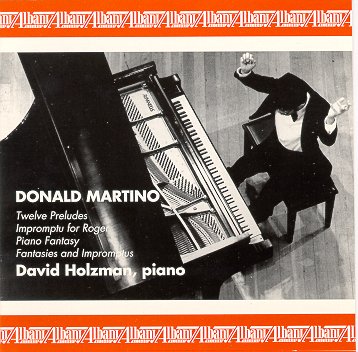 DH: No, but I’ll wait for someone else to buy
it and if they call me and tell me they like it maybe I’ll listen to it again.
Actually though, that’s an exaggeration. I’ve found that I’ve listened
to this CD a lot, and that is unique for me. It’s a way of saying that
the playing is better than anything I can recall. Even that Martino
disc which won so much praise was not nearly as good as the performance I
gave last month in New York. Again, it was the utter lack of struggle
and self-consciousness in the recent concert. Even if notes were not
quite perfect, spontaneity was there throughout. It doesn’t happen
often, but that’s the goal you strive for - just being able to close your
eyes from beginning to end.
DH: No, but I’ll wait for someone else to buy
it and if they call me and tell me they like it maybe I’ll listen to it again.
Actually though, that’s an exaggeration. I’ve found that I’ve listened
to this CD a lot, and that is unique for me. It’s a way of saying that
the playing is better than anything I can recall. Even that Martino
disc which won so much praise was not nearly as good as the performance I
gave last month in New York. Again, it was the utter lack of struggle
and self-consciousness in the recent concert. Even if notes were not
quite perfect, spontaneity was there throughout. It doesn’t happen
often, but that’s the goal you strive for - just being able to close your
eyes from beginning to end.
BD: Does it ever happen?
DH: Yes. It happens more and more and the joy of having my eyes closed is wonderful because really 88 keys are not that many.
BD: Thank you for being a performer and for taking such great care with the composers.
DH: All right, you sound like you mean it. If you mean it, wonderful. Thank you.
BD: I do.
== == == == == ==
- - - - - - -
== == == == == ==
Visit David Holzman's Website [ http://www.battlemuse.com ]
Bruce Duffie is a regular contributor of interviews to New Music Connoisseur
Linked from New Music Connoisseur Magazine, Summer, 2003
© 2001 Bruce Duffie
This conversation was recorded at his hotel in Evanston, Illinois, on November 30, 2001. Portions were broadcast on WNUR six months later. This transcription was made in 2003 and published in New Music Connoisseur, and posted on this website at that time.
To see a full list (with links) of interviews which have been transcribed and posted on this website, click here.
Award - winning broadcaster Bruce Duffie was with WNIB, Classical 97 in Chicago from 1975 until its final moment as a classical station in February of 2001. His interviews have also appeared in various magazines and journals since 1980, and he now continues his broadcast series on WNUR-FM.
You are invited to visit his website for more information about his work, including selected transcripts of other interviews, plus a full list of his guests. He would also like to call your attention to the photos and information about his grandfather, who was a pioneer in the automotive field more than a century ago. You may also send him E-Mail with comments, questions and suggestions.